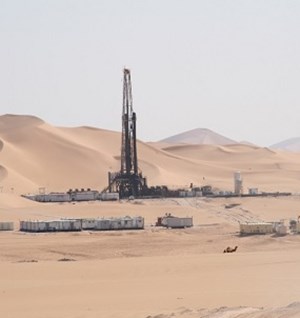Libya’s “dramatic” oil minister replacement may revive production following years of volatility
(Bloomberg) – The dramatic replacement of Libya’s oil chief may help drive deals and revive the OPEC member’s beleaguered energy sector, but a fragmented political picture still leaves numerous hurdles for international firms to negotiate.
Oil Minister Mohamed Oun was suspended this week as a government agency investigates alleged violations including “circumventing the law and wasting public money.” Within hours, a replacement was named from within the board of the state-run National Oil Corp., which has frequently been at loggerheads with the ministry on policy. Oun has denied any wrongdoing and said the probe should be expedited.
Khalifa Abdul Sadiq’s move to the hot seat likely aligns the NOC and the ministry, potentially laying the ground for a short-term revival of the oil and gas sector that’s key for Libya’s economy and a crucial source of supply to global markets. Whether it will lead to sustained higher production remains uncertain as simmering feuds in the North African country that’s divided between rival governments can quickly send the industry into turmoil.
The minister’s ousting removes one of the obstacles to recent high-profile agreements with foreign players, according to Iliasse Sdiqui, associate director at Whispering Bell, a risk management firm. But “with or without Oun,” the Tripoli-based government “will find it difficult to implement new deals locally without any resistance,” he said.
Libya holds Africa’s largest crude reserves, but over a decade of political strife has taken its toll and production is frequently held hostage to struggles between the dueling administrations in Tripoli and the east. Production that reached almost 1.8 MMbpd in 2008 slumped to some 100,000 bpd following the killing of Moammar Al Qaddafi in 2011’s civil war. Volatile ever since, it’s currently at about 1.2 MMbpd.
Oun was made oil minister in 2021 as Prime Minister Abdul Hamid Dbeibah’s internationally recognized government based in the capital, Tripoli, tried to put greater checks on the NOC. The state company’s long-standing chairman, Mustafa Sanalla, had effectively been running the sector for years in the absence of an oil minister.
Oun’s attempt to assert control sparked deep splits and chaos in the industry and resulted in the minister’s attempts to oust Sanalla in 2021. Sanalla managed to hold on before he was forced out the following year, in a push widely seen as a compromise between Libya’s feuding sides.
Oun also rejected some deals and agreements backed by NOC’s new Chairman Farhat Bengdara and the government in Tripoli, further straining relations.
An agreement for Italy’s Eni SpA to invest $8 billion in two gas fields in the Mediterranean fell through last year after Oun said the deal was done without the ministry’s approval. He also said it gave Eni too big a stake.
Greater checks. Oun turned out to not be a “yes” man, which means he’s no longer needed, according to Jalel Harchaoui, an associate fellow at the London-based Royal United Services Institute. “Dbeibah now needs to show very tangible energy initiatives without weeks and months of procrastination and back and forth between the NOC and the oil ministry,” he said.
Oun also blocked a recent deal with the United Arab Emirates to develop the Dahra field in central Libya.
More cohesion between the ministry and NOC won’t automatically mean more deals, as “there are more hurdles to overcome including local security challenges, tribal dynamics and stakeholder management,” said Whispering Bell’s Sdiqui.
For oil production to return to pre-2011 levels, there will need to be sustained investment as well as lasting peace and political stability.
While oil companies have a high appetite risk for Libya, they closely monitor internal politics between oil officials, something that “undermines long-term planning and is resource-intensive,” Sdiqui said.



